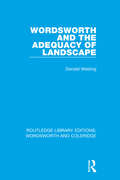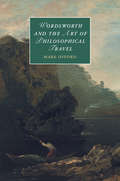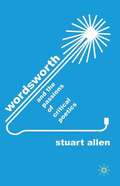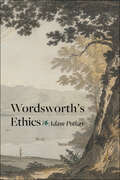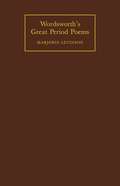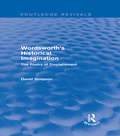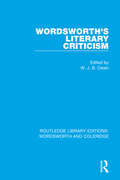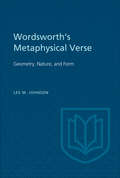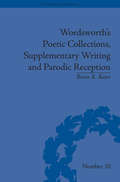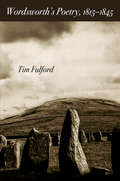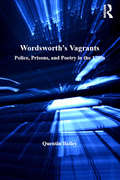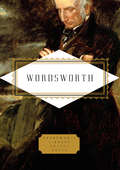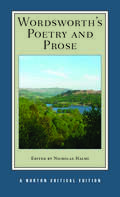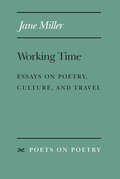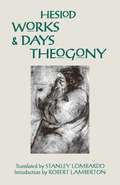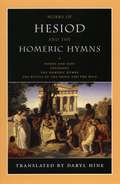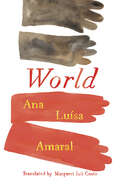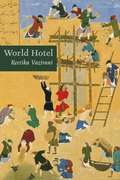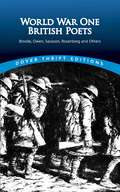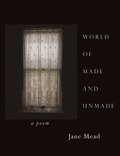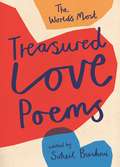- Table View
- List View
Wordsworth and the Adequacy of Landscape (RLE: Wordsworth and Coleridge #12)
by Donald WeslingFirst published in 1970, this stylistic and interpretative account of some of Wordsworth’s major poetry examines description and meditation in his landscape writing. It describes the integration of two kinds of thinking, and a variety of beauties and lapses that come from their separation. Although Wordsworth’s deepest affinity was with nature, the author argues the finest landscape writing of the poet’s late twenties and early thirties derives from his attempt to humanise his love of nature. This work therefore aims to examine the way in which Wordsworth strives in his poetry to extend his range of concern from love of nature to love of mankind.
Wordsworth and the Art of Philosophical Travel (Cambridge Studies in Romanticism)
by Mark OffordAt the heart of Wordsworth's concerns is the question of how travel - both foreign and everyday - might also become an adventure into philosophy itself. This is an art of travel both as an approach to experience - one that draws on habits in order to revise them in the shock of new - and as a poetic approach that gives voice to the singular and foreign through the unique shapes of verse. Close readings of Wordsworth's 'pictures of Nature, Man, and Society' show how the natural is entangled with - and not simply opposed to, as many critics have suggested - the social, the political and the historical in this verse. This book draws on both eighteenth-century anthropology and travel literature, and debates in modern critical theory, to highlight Wordsworth's remarkable originality and his ongoing ability to transform our theoretical prejudgements in the unknown territory of the travel encounter.
Wordsworth and the Enlightenment Idea of Pleasure
by Rowan BoysonAncient questions about the causes and nature of pleasure were revived in the eighteenth century with a new consideration of its ethical and political significance. Rowan Boyson reminds us that philosophers of the Enlightenment, unlike modern thinkers, often represented pleasure as shared rather than selfish, and she focuses particularly on this approach to the philosophy and theory of pleasure. Through close reading of Enlightenment and Romantic texts, in particular the poetry and prose of William Wordsworth, Boyson elaborates on this central theme. Covering a wide range of texts by philosophers, theorists and creative writers from over the centuries, she presents a strong defence of the Enlightenment ideal of pleasure, drawing out its rich political, as well as intellectual and aesthetic, implications.
Wordsworth and the Passions of Critical Poetics
by Stuart AllenThis scholarly study presents a new political Wordsworth: an artist interested in 'autonomous' poetry's redistribution of affect. No slave of Whig ideology, Wordsworth explores emotion for its generation of human experience and meaning. He renders poetry a critical instrument that, through acute feeling, can evaluate public and private life.
Wordsworth's Ethics
by Adam PotkayA comprehensive examination that breathes new life into Wordsworth and the ethical concerns that were vital to his nineteenth-century readers.Why read Wordsworth’s poetry—indeed, why read poetry at all? Beyond any pleasure it might give, can it make one a better or more flourishing person? These questions were never far from William Wordsworth’s thoughts. He responded in rich and varied ways, in verse and in prose, in both well-known and more obscure writings.Wordsworth's Ethics is a comprehensive examination of the Romantic poet’s work, delving into his desire to understand the source and scope of our ethical obligations. Adam Potkay finds that Wordsworth consistently rejects the kind of impersonal utilitarianism that was espoused by his contemporaries James Mill and Jeremy Bentham in favor of a view of ethics founded in relationships with particular persons and things. The discussion proceeds chronologically through Wordsworth’s career as a writer—from his juvenilia through his poems of the 1830s and '40s—providing a valuable introduction to the poet’s work. The book will appeal to readers interested in the vital connection between literature and moral philosophy.
Wordsworth's Great Period Poems: Four Essays
by Marjorie LevinsonThe book presents four major poems from Wordsworth's great period of creativity, 1798-1805: Tintern Abbey, Michael, The Intimations Ode, Peele Castle.
Wordsworth's Historical Imagination: The Poetry of Displacement (Routledge Revivals)
by David SimpsonTraditionally, Wordsworth’s greatness is founded on his identity as the poet of nature and solitude. The Wordsworthian imagination is seen as an essentially private faculty, its very existence premised on the absence of other people. In this title, first published in 1987, David Simpson challenges this established view of Wordsworth, arguing that it fails to recognize and explain the importance of the context of the public sphere and the social environment to the authentic experience of the imagination. Wordsworth’s preoccupation with the metaphors of property and labour shows him to be acutely anxious about the value of his art in a world that he regarded as corrupted. Through close examination of a few important poems, both well-known and relatively unknown, Simpson shows that there is no unitary, public Wordsworth, nor is there a conflict or tension between the private and the public. The absence of any clear kind of authority in the voice that speaks the poems makes Wordsworth’s poetry, in Simpson’s phrase, a ‘poetry of displacement’.
Wordsworth's Literary Criticism (RLE: Wordsworth and Coleridge #13)
by W. J. B. OwenFirst published in 1974. Wordsworth, with Coleridge, is the major literary critic of the Romantic period. This volume assembles all of Wordsworth’s formal critical writings and a selection of critical comments from his correspondence. These documents are invaluable for Romantic poetry at large, and his theories — particularly on poetic diction, ordinary language and the nature of the creative process — inspired lively critical debate. This book discusses the nature and origin of Wordsworth’s criticism in general, and the literary tradition from which they sprang. The texts are succinctly annotated and there is a select bibliography. This book will be of interest to students of literature.
Wordsworth's Metaphysical Verse: Geometry, Nature, and Form
by Lee JohnsonIn his philosophic verse, Woodsworth identifies the history of poetry and geometrical thought as the two chief treasures of the mind and as main sources of his poetic inspiration. He assigns transcendental value to geometry and indicates that he attempts to apply its proportions to the laws of nature. In this book, Professor Johnson demonstrates how Wordsworth also employed geometrical patterns in the metrical construction of his verse and how the character of those patterns can be related to the poet's major philosophical values. Johnson shows how Wordsworth, when writing about the nature and significance of geometrical thought in The Prelude and The Excursion, designs his verse paragraphs in accordance with simple geometrical proportions which are thereby associated with the metaphysical value he attributes to geometry. Wordsworth finds geometrical forms to be hidden in the natural landscape and inherent in the structures of perception itself. This book is the first to make a sustained description of Wordsworth's symbolic patterns and metrical forms in his philosophic verse, with major examples drawn from Tintern Abbey, The Prelude, The Excursion, and the Immortality Ode. Although it presents an approach which differs radically from any in the established criticism of the poet, it is basically at one with the large body of work that concerns the nature of Wordsworth's imagination.
Wordsworth's Poetic Collections, Supplementary Writing and Parodic Reception (The History of the Book #10)
by Brian R BatesWordsworth’s process of revision, his organization of poetic volumes and his supplementary writings are often seen as distinct from his poetic composition. Bates asserts that an analysis of these supplementary writings and paratexts are necessary to a full understanding of Wordsworth’s poetry.
Wordsworth's Poetry, 1815-1845 (Haney Foundation Series)
by Tim FulfordThe later poetry of William Wordsworth, popular in his lifetime and influential on the Victorians, has, with a few exceptions, received little attention from contemporary literary critics. In Wordsworth's Poetry, 1815-1845, Tim Fulford argues that the later work reveals a mature poet far more varied and surprising than is often acknowledged. Examining the most characteristic poems in their historical contexts, he shows Wordsworth probing the experiences and perspectives of later life and innovating formally and stylistically. He demonstrates how Wordsworth modified his writing in light of conversations with younger poets and learned to acknowledge his debt to women in ways he could not as a young man. The older Wordsworth emerges in Fulford's depiction as a love poet of companionate tenderness rather than passionate lament. He also appears as a political poet—bitter at capitalist exploitation and at a society in which vanity is rewarded while poverty is blamed. Most notably, he stands out as a history poet more probing and more clear-sighted than any of his time in his understanding of the responsibilities and temptations of all who try to memorialize the past.
Wordsworth's Vagrants: Police, Prisons, and Poetry in the 1790s (British Literature In Context In The Long Eighteenth Century Ser.)
by Quentin BaileyWordsworth's Vagrants explores the poet's treatment of the 'idle and disorderly' in the context of the penal laws of the 1790s, when the terror of the French Revolution caused a crackdown on the beggars and vagrants who roamed the English countryside. From his work on the Salisbury Plain poems through to the poetry about vagrants, beggars, and lunatics in Lyrical Ballads, Quentin Bailey argues, Wordsworth attempted to imagine a way of relating to the vagrant and criminal poor that could challenge the systematizing impulses of William Pitt and Jeremy Bentham. Whereas writers had previously relied on sensibility and fellow-feeling to reveal the correct ordering of society, Wordsworth was writing in a period in which legislators, magistrates, and commentators agreed that a more aggressively interventionist approach and new institutional solutions were needed to tackle criminality and establish a disciplined and obedient workforce. Wordsworth's interest in individual psychology and solitude, Bailey suggests, grew out of his specific awareness of the Bloody Code and the discussions surrounding it. His study offers a way of reading Wordsworth's poetry that is sensitive to his early radicalism but which does not equate socio-political engagement solely with support for the French Revolution.
Wordsworth: Poems (Everyman's Library Pocket Poets Series)
by William WordsworthOf all the lasting innovations that William Wordsworth (1770-1850) brought to our literature, it is his discovery of nature and his fresh vision of human lives in the context of nature that have most influenced our cultural climate. Here, collected in this volume, are Wordsworth's finest works, some of the most beautiful poems ever written: from the famous lyrical ballads, including "The Tables Turned" and "Lines Composed a Few Miles Above Tintern Abbey," to the sonnets and narrative poems, to excerpts from his magnum opus, The Preludes. By turning away from mythological subjects and artificial diction toward the life and language around him, Wordsworth acquired for poetry the strength and new sources of inspiration that have allowed it to survive and flourish in the modern world.
Wordsworth’s Poetry and Prose
by Nicholas HalmiThis Norton Critical Edition presents a generous selection of William Wordworth's poetry (including the thirteen-book Prelude of 1805) and prose works along with supporting materials for in-depth study. Together, the Norton Critical Editions of Wordsworth's Poetry and Prose and The Prelude: 1799, 1805, 1850 are the essential texts for studying this author. Wordsworth's Poetry and Prose includes a large selection of texts chronologically arranged, thereby allowing readers to trace the author's evolving interests and ideas. An insightful general introduction and textual introduction precede the texts, each of which is fully annotated. Illustrative materials include maps, manuscript pages, and title pages. "Criticism" collects thirty responses to Wordsworth's poetry and prose spanning three centuries by British and American authors. Contributors include Samuel Taylor Coleridge, Percy Bysshe Shelley, Felicia Hemans, Ralph Waldo Emerson, Lucy Newlyn, Stephen Gill, Neil Fraistat, Mary Jacobus, Nicholas Roe, M. H. Abrams, Karen Swann, Michael O'Neill, and Geoffrey Hartman, among others. The volume also includes a Chronology, a Biographical Register, a Selected Bibliography, and an Index of Titles and First Lines of Poems.
Working Time: Essays on Poetry, Culture, and Travel (Poets On Poetry)
by Jane MillerWorking Time collects essays by prize-winning poet Jane Miller on the subjects of poetry, travel, and culture. The discussions of contemporary poetry begin with excursions into geography, where language literally “takes shape.” Each essay is set in a landscape, where the notion of travel as a poetic experience, from the American Southwest to places in Italy, France, and Spain, is explored. The essays consider notions of time, duration, narrative, documentary, and history in American poetry, and view poetry in the light of developments in feminism, postmodern theory, and contemporary poetic practice. In addition to poetry, Miller investigates a range of cultural products and art forms, including film, video, photography, painting, sculpture, music, and the Madonna phenomenon.
Works and Days and Theogony (Hackett Classics)
by Hesiod Stanley Lombardo Robert Lamberton"Robert Lamberton's Introduction is an excellent, concise exposition of current scholarly debate: his notes are informative and helpful. . . . Those who want a translation that captures something of the spirit of an ancient Greek poetic voice and its cultural milieu and transmits it in an appealing, lively, and accessible style will now turn to Lombardo." --M. A. Katz, Wesleyan University, in CHOICE
Works of Auvaiyar:Atichuti, Konrai Vendan, Muturai and Nalvazhi
by Auvaiyari) AticuTi: contains 109 morals in one line with few words ii)Konrai Vendhan: 91 one line moral verses the first letter of each starts with alphabetical and consonants order. iii) Muturai: contains 40 verses of four lines each preaching morals and ethics. iv) Nalvazhi: contains 40 verses of advises of good deeds that will lead to a good life.
Works of Hesiod and the Homeric Hymns: Theogony • Works and Days • The Homeric Hymns • The Battle of the Frogs and the Mice
by Daryl HineWinner of the 2005 Harold Morton Landon Translation Award from the Academy of American Poets. In Works of Hesiod and the Homeric Hymns, highly acclaimed poet and translator Daryl Hine brings to life the words of Hesiod and the world of Archaic Greece. While most available versions of these early Greek writings are rendered in prose, Hine's illuminating translations represent these early classics as they originally appeared, in verse. Since prose was not invented as a literary medium until well after Hesiod's time, presenting these works as poems more closely approximates not only the mechanics but also the melody of the originals. This volume includes Hesiod's Works and Days and Theogony, two of the oldest non-Homeric poems to survive from antiquity. Works and Days is in part a farmer's almanac—filled with cautionary tales and advice for managing harvests and maintaining a good work ethic—and Theogony is the earliest comprehensive account of classical mythology—including the names and genealogies of the gods (and giants and monsters) of Olympus, the sea, and the underworld. Hine brings out Hesiod's unmistakable personality; Hesiod's tales of his escapades and his gritty and persuasive voice not only give us a sense of the author's own character but also offer up a rare glimpse of the everyday life of ordinary people in the eighth century BCE. In contrast, the Homeric Hymns are more distant in that they depict aristocratic life in a polished tone that reveals nothing of the narrators' personalities. These hymns (so named because they address the deities in short invocations at the beginning and end of each) are some of the earliest examples of epyllia, or short stories in the epic manner in Greek. This volume unites Hine's skillful translations of the Works of Hesiod and the Homeric Hymns—along with Hine's rendering of the mock-Homeric epic The Battle of the Frogs and the Mice—in a stunning pairing of these masterful classics.
Worksong
by Gary PaulsenPeople at work, doing things that are so essential to us all, are lyrically depicted in Gary Paulsen's spare and elegant verse.
World
by Ana Luísa AmaralPoems of effervescent grace—about nature, magpies, reality, “the unreasons of this world,” and spiders—from one of Portugal’s most beloved poets, published in a beautiful bilingual edition World—Ana Luísa Amaral’s second collection with New Directions—offers a new exhilarating set of poems that convey wonder, bemusement, and an ever-deepening appreciation of life. Weaving the thread that connects the poem to life, World speaks of our immense human perplexity in the face of everything around us and our oneness with it all. As Amaral notes, all of us, “humans and non-humans, are on the same ontological level, the differences being only a matter of perspective. We are all made of the same stuff as dreams—and stars.” Asked about her thoughts on World, Amaral’s peerless translator Margaret Jull Costa replied: “What I take from this collection of poems is a sense of joy in the ordinary—seeing an ant going about its business, or a bee or a fish, or the feeling of sharing a whole history with a particular table, or watching a very ordinary woman sitting on a train playing with the handle of her handbag. World also brings us meditations on colonization, slavery, and whaling. Like the world, it is full of surprises and full of joy and sadness.” These vibrant, exultant poems invite you to share this marvelous world: Yes, all you need (how easy!) is to say yes.
World Hotel
by Reetika Vazirani<P>Born in India and raised in the U.S., Reetika Vazirani is at the forefront of a group of young immigrant writers who are questioning citizenship and the effects of migration and immigration on the discovery of one's self. The topics she writes about--eastern culture meeting west--are both timely and timeless, as she demonstrates a love for storytelling, delights in the music and flavors of the world, and displays a subtle understanding of cross-cultural conflicts for women. <P>Divided into two sections, "Inventing Maya" and "It's Me, I'm Not at Home," World Hotel gives voice to those who are struggling with the burden of being different while also experiencing the thrill of transformation. There are poems written in memory of family members, to husbands, to lovers, and poems from mother to daughter. <P>Through her exquisite formal skills and linguistic range, Vazirani ultimately creates a home in poetry; for her readers she creates penetrating portraits and keen glimpses into a world which-for all its unfamiliarity-we recognize as strikingly similar to our own. <P>The Chapel Hill Rotary invited me twice, and I wore Aunty's yellow sari. I laugh, for ten years I lived on a mountain. I show them Mussoorie. They say it looks like the Blue Ridge. They're fascinated by so much silk-six yards on one girl--but I like dresses and scarves, red nail polish, and I will have to learn to dance. ... -from "Friday Mixer". <P>Born in India, Reetika Vazirani's first book,White Elephants, was selected for the Barnard New Women Poets Prize. She has received much recognition for her poetry, including a Pushcart Prize, a "Discovery" award from The Nation, and inclusion in Best American Poetry. Educated at Wellesley College and the University of Virginia, Vazirani serves as an advisory editor for Callaloo.
World Tapestries: An Anthology of Global Literature
by Globe FearonThis collection of unadapted classic and contemporary literature features the work of authors from various world cultures.
World War One British Poets: Brooke, Owen, Sassoon, Rosenberg and Others (Dover Thrift Editions: Poetry Ser.)
by Candace WardA complex series of treaties, tensions and alliances involving the major and minor European states led to the assassination of Archduke Franz Ferdinand of Austria by Gavrilo Princip, a Serbian nationalist, on June 28, 1914. In response, the armies of Europe were mobilized and by summer's end, the world was at war. But no one could have foreseen the apocolyptic degree of destruction that ensued. By the time the Armistice was signed on November 11,1918, more than nine million military personnel and five million civilians had been killed. In Great Britain and Europe, an entire generation of young men was wiped out. Most of the poets in this anthology participated in what came to be called the Great War; many of them did not survive to see its end. Some, like Rupert Brooke and John McCrae, believed their services were part of a noble and just cause. Others - most notably Siegfried Sassoon and Wilfred Owen - entered the military through a sense of duty, though both poets came to see Britain's participation in the war as unnecessarily prolonged. Antiwar sentiment was not uncommon among soldiers, particularly when it became clear that the war was one of attrition. By September 1914, the Allied and Central Powers were locked into trench warfare, and 1915-1916 were years of stalemate characterized by Pyrrhic victories such as that won by the Allies in Champagne, where 500 yards of ground was gained over the course of two months - at a cost of 50,000 men. Such results contributed to a sense of futility experienced by frontline soldiers, and chlorine gas, first deployed on the Western Front on April 22, 1915 at the Battle of Ypres, intensified the horrors of battle. The initial patriotic fervor that compelled many young men to enlist in the summer of 1914 had, in most cases, by 1916 collapsed into cynicism and anger, as reflected in a saying that circulated among the British troops: "Went to war with Rupert Brooke, came home with Siegfried Sassoon." While not all of the poets contained in this anthology served combat duty, all were touched by the devastation that changed the world's perception of war. Despite the propaganda and intense anti-German sentiment that proliferated during the war, "this was no case," as Edward Thomas wrote, "of petty right or wrong." All of the poetry - whether the manifestation of the poets' despair, outrage or patriotism -- stands as a memorial that has outlasted the battle lines of World War One.
World of Made and Unmade
by Jane MeadMead's fifth collection candidly and openly explores the long process that is death. These resonant poems discover what it means to live, die, and come home again. We're drawn in by sorrow and grief, but also the joys of celebrating a long life and how simple it is to find laughter and light in the quietest and darkest of moments.
World's Most Treasured Love Poems
by Suheil BushuriThe only truly global collection of love poetry, bringing together the most stunning and inspiring poems from all around the worldThis beautiful collection of love poems gathers together thousands of years of timeless verse from around the world. From Shakespeare to Rossetti, traditional English classics sit alongside the works of Eastern writers such as Ibn 'Arabi and Rumi, as well as lesser known gems from the indigenous peoples of Africa, Australasia, and the Americas. Exploring the many facets of love – desire, devotion, delirium, joy, and sorrow – this uniquely diverse volume offers us wisdom from across the ages and reminds us of the bonds we all share.
